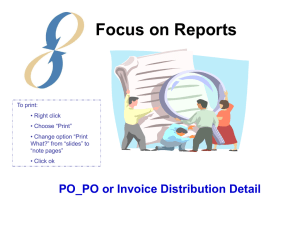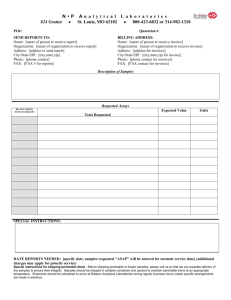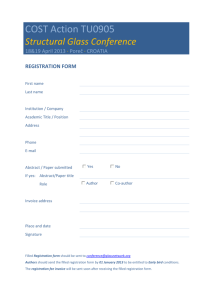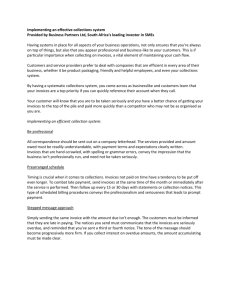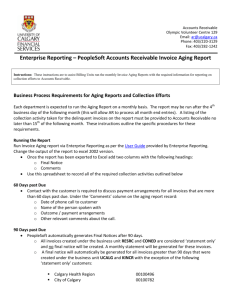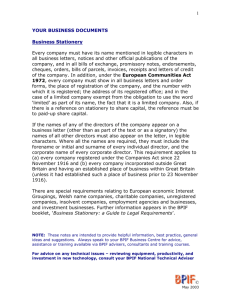Project Director's Manual
advertisement
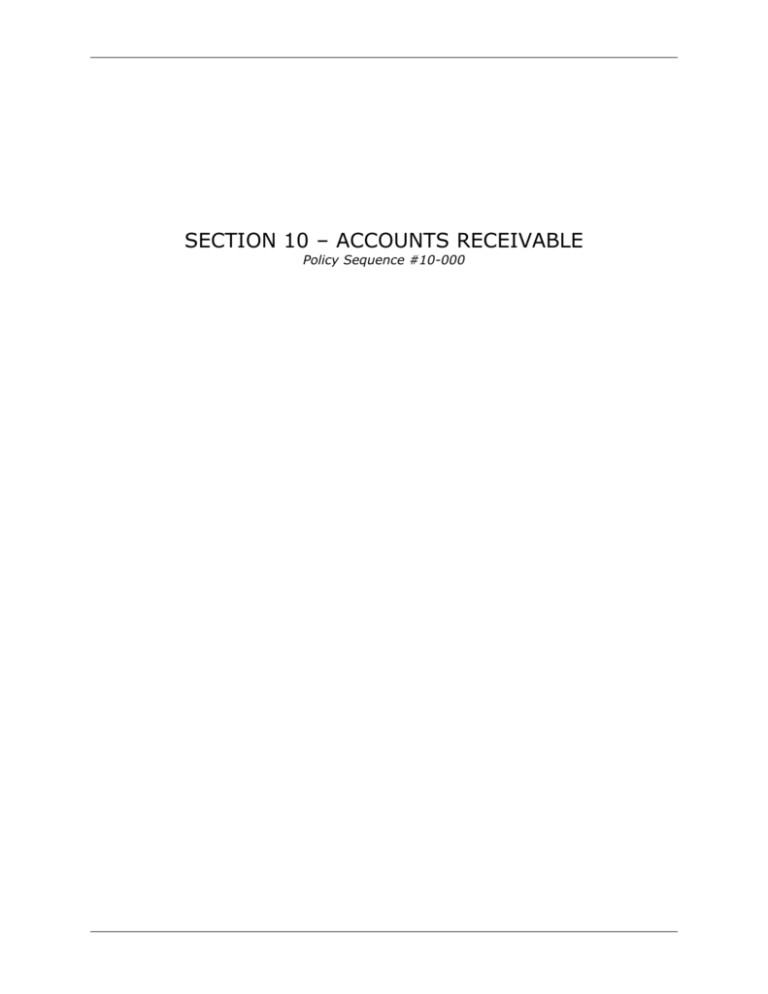
SECTION 10 – ACCOUNTS RECEIVABLE Policy Sequence #10-000 This page intentionally left blank. INTRODUCTION Foundation Programs, Sponsored Programs, Grants and Contracts receive revenue that is credited via the Foundation into individual projects. The Foundation recognizes revenue (1) when cash is received or; (2) by the accrual method when invoices are processed. There are separate procedures for each process in this section of the Project Director's Manual. FOUNDATION PROGRAMS AND SIMILAR ACCOUNTS (06XXXX00 and 49XXXX00) Policy # 10-000.1 Invoices: Pre-numbered invoices are checked out to the project and become the responsibility of the Project Director. Every invoice is considered potential revenue and must be accounted for. Voided invoices must be returned to the Foundation Accounting Assistant. Project staff must complete the invoices using the procedures in this section. The Invoice is a three ply form. The project sends the Original and Remittance copies to the client. The goldenrod copy is sent to the Foundation Accounting Assistant where it is logged and filed by invoice number awaiting payment through the Cash Receipts subsystem. The project makes a copy for their records. Invoices: (Using the Manual System) Manual A/R invoices are not posted to the general ledger system until payment is received. Foundation Programs invoices are logged and filed by invoice numbers. When payment is received, the invoice is pulled from the unpaid invoice file, and revenue is recorded to the project via the Cash Receipts system. Revenue is not credited to the project until payment is actually received by the Foundation. It is the Project Director's responsibility to collect remittance of an invoice and process the cash through the Foundation's cash receipts system. If the Project Director chooses to operate his/her own billing and collection systems, he/she accepts related liability and accountability for compliance with Foundation, University and GAAP policy, procedures, and internal control requirements. The Project Director or their designated staff are required to keep current on their billing and collection systems. Invoices: (Using the Automated Accounts Receivable System - AARS) Foundation Programs have the option of using the Foundation's Automated Accounts Receivable System (AARS). Pre-numbered invoices are checked out to the project and become the responsibility of the Project Director. Every invoice is considered potential revenue and must be accounted for. Voided invoices must be returned to the Foundation Accounting Assistant. Project staff must complete the invoices using the procedures in this section. When the Foundation Accounting Assistant receives the goldenrod copy of the invoice, it is entered into the Accounting system. The total invoice amount is posted as revenue to the project. The Foundation allows 60 days for actual cash to be received. If remittance of the invoice is not received within 60 days, the invoice is reversed and related revenue is charged to the project. The Project Director is notified, and it is henceforth his/her responsibility to collect payment from the debtor. Once the remittance is collected, it should be deposited, through the cash receipts procedure. If the Project Director chooses to operate his/her own billing and collection systems, he/she accepts related liability and accountability for compliance with Foundation, University and September 2008 1 Section 10 GAAP policy, procedures, and internal control requirements. The Project Director or their designated staff is required to keep current on their billing and collection systems. Follow-Up On Past Due Invoices: The Foundation Accounting Assistant generally does not follow up on past due Foundation Programs' invoices. Such follow-up is considered the responsibility of the Project Director. The Foundation Accounting Assistant will send the Project Director a list of outstanding invoices monthly for informational purposes. If invoices have been outstanding for more than a year, they will be automatically removed from the list. Insufficient Funds: If a check is returned for insufficient funds, a Journal Entry is prepared by the Foundation Cashier charging the project account for the amount of the check. The journal entry and all supporting document is reviewed and approved by the Director of Finance & Accounting and allowability approved by the Grants & Contracts Administrator after which it is posted to the general ledger by the Associate Director of Finance & Accounting. A copy of the Journal Entry and the returned check are sent to the Project Director. It is the Project Director's responsibility to follow up in order to recoup the funds. If the check was payment for an invoice, collection procedures should be followed. Bank fees for NSF (Non-Sufficient Fund) checks will be charged to the project. SPONSORED PROGRAMS, GRANTS AND CONTRACTS (07XXXXXX) Policy # 10-010.1 Letters of Credit: Federally funded projects, which comprise the largest percentage of sponsored projects received by the Foundation, are paid through a Letter of Credit mechanism. When a grantee is a recipient of funds at a predetermined level, Letters of Credit may be established. This mechanism greatly expedites payment. The Foundation has Letter of Credit arrangements with the Department of Health and Human Services, National Science Foundation, and the U.S. Department of Education. Basically, the Foundation estimates its cash needs at least 3 days in advance of the disbursements for Letter of Credit. Cash is requested and electronically transferred directly into the Foundation's bank general account. The funds are then recorded to each grant through the Foundation's AARS. Grants and Contracts Administrators are responsible to ensure that all Letter of Credit disbursements are paid from funds drawn in advance. Invoices: Sponsored Programs, Grants, and Contracts may also receive revenue through the Foundation's AARS via invoicing. The Foundation Grants & Contracts Administrator invoices the sponsor, usually on a monthly basis, as expenses are incurred, or after specific performance requirements are accomplished. This process is known as Cost Reimbursement. The award document for a grant or contract will specify the procedure to be used. The Grants and Contracts Administrators work with the sponsor, Project Director, and Foundation Accounting Assistant to implement and maintain these procedures. The Project Director is responsible for complying with the requirements specified in the award document to ensure prompt reimbursement. The requirements include adhering to prescribed standards of performance and submitting progress reports, original receipts for allowable expenses, etc. in a timely manner. The Grants and Contracts Administrator of the project should always receive a copy of any reports, written documentation, or September 2008 2 Section 10 correspondence sent directly to the sponsor by the Project Director. If the Grants and Contracts Administrator has to contact the sponsor for collection purposes, complete documentation of the project activity will be needed. Collection Procedures for Past Due Invoices: The Foundation Accounting Assistant calls or emails the funding source and the Grants and Contracts Administrator when invoices are 30 days past due. At 60 days past due, a Past Due letter is sent to the funding source and copies are sent to the Project Director and GCA, requesting immediate payment. At 90 days past due, a Second Notice Past Due letter is mailed to the funding source and the Project Director. Simultaneously, a meeting with the Project Director in concert with the Foundation Grants and Contract Administrator will be scheduled to resolve problems and clarify issues. At 120 days, consideration should be given to terminate the agreement for non-payment. Uncollectible Invoices: After the Foundation has followed up on past due invoices for a total of 120 days, the invoice may be considered uncollectible. If reason for non-payment is deemed to be the Project Director's fault, the funds will be charged to the project's Indirect Cost Return distribution (see Section 8 Indirect Cost Return Policy). If the reason for non-payment is deemed to be the Foundation's fault, the Foundation will absorb the cost. If the reason for non-payment is deemed to be the sponsor's fault, the invoice may be referred to a collection agency or legal counsel. The final decision for all write offs will be the responsibility of the Foundation's Executive Director after recommendation from Foundation Division Directors. Non-Sufficient Funds: If a check is returned for Non-Sufficient Funds, a Journal Entry is prepared by the Foundation Cashier charging the project account for the amount of the check. A copy of the Journal Entry and the returned check are sent to the Project Director. It is the Project Director's responsibility to follow up in order to recoup the funds. If the check was payment for an invoice, the Foundation will implement the procedures detailed above. Bank fees for NSF (Non-Sufficient Fund) checks will be charged to the project. Cost Sharing: Some sponsors award contracts on a cost-sharing basis. The sponsor will pay a share of the cost of the contract (Sponsor's Share) and the Project, University, or Foundation will pay the balance (Recipient's Share). When a project requires cost sharing, the Project Director must identify the matching sources on the Grants Proposal Internal Clearance Form (Green Sheet) at the proposal stage (see Section 2 - cost Sharing and /or Cost Matching). In most cases, documentation of the Recipient's Share is needed to bill for the Sponsor's Share. The Grants and Contracts Administrators will request the Project Director to provide the necessary information for the billing 30 days prior to the payment schedule. The Project Director is responsible for ensuring that such funds are available and that the documentation is relevant to facilitate the billing. September 2008 3 Section 10 This page intentionally left blank. September 2008 Section 10
